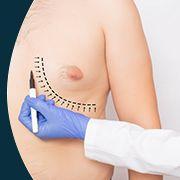Pre and Post Gynecomastia Surgery: Essential Things to Know
In This Article
Pre and Post Gynecomastia Surgery: Essential Things to Know
Jaseela
Updated on February 08, 2024
Medically verified by Dr. Arya
Fact checked by Dr. Arya

Cosmetic
6 min read
Are you thinking about getting gynecomastia surgery? And want to know how to prepare for it, and what would happen following the procedure?
Well, you are at the right place. Our goal is to simplify all the important things you need to be aware of Gynecomastia surgery preparation.
Mykare Health covers everything in this guide, from what to expect before the procedure to what to do afterwards. Whether it is understanding the preparation, the procedure itself, or the recovery period - we will cover everything.
Let’s now delve into each of these stages and understand gynecomastia surgery preparation and post-operative care in a better way.
What Is Gynecomastia?
Gynecomastia surgery is a medical procedure used to reduce enlarged male breast tissues. The major reason for choosing this surgery is to get over the dissatisfaction with one's chest. This condition is commonly known as man boobs.
The intention is to help you feel more at ease and confident about your bodies by achieving the usual male chest form.
For people who want to address the emotional and physical discomfort that comes with having larger male breasts, gynecomastia surgery can be a good first step.
Gynecomastia Surgery Preparation
How do you exactly prepare for gynecomastia surgery?
During the diagnostic and physical exam, it is important for the patient to be open and honest with the doctor. The patient should be able to answer the doctor's questions about their health, lifestyle, and habits honestly. Once the surgery has been scheduled, prepare according to the doctor’s instructions.
If your job involves great physical efforts, you should take at least 15 days of leave. If not, you should take two days of leave after the surgery. Ask someone to take you home.
Preparing for surgery is just as important as recovering. A patient who is well-prepared is more likely to get the desired results than one who is not, and it also reduces the risk of complications.
Here are some of the things you need to do to prepare for surgery:
-
Get lab tests and go through all diagnostic tests.
-
Quit smoking at least two weeks before your surgery.
-
Stop drinking alcohol for at least one week before the surgery.
-
Don’t take blood thinners like aspirin or anti-inflammatory drugs and supplements.
-
After speaking with your doctor, adjust your medications as needed.
Gynecomastia Surgery Procedure
Once a diagnosis is made, the doctor recommends liposuction and gland excision for permanent treatment of gynaecomastia. The liposuction procedure involves the following steps:
-
Anesthesia is given to the patient to make them unconscious.
-
A combination of saline solution and fat-soluble solution are injected into the fat area
-
A cannula is inserted by the doctor
-
Ultrasonic waves are emitted to loosen the fat
-
Lift the fat out of the tube
-
Closes the incisions
The gland excision procedure involves the following steps:
-
The anesthesiologist will administer anesthesia to the patient.
-
The doctor will then make several incisions around the breast.
-
The surgeon will then remove the excess tissue from the breast and remove the nipple area.
-
Finally, the surgeon will close the incisions by dissolving the glue.
Recovery After Gynecomastia Surgery
Here’s how you will recover.
-
You must wear the compression garment 24 hours a day, 7 days a week, with no exceptions. If this is not the case, the results won’t be as expected and there is a high risk of complications.
-
The recovery process usually takes around 4-6 weeks, but it can take longer depending on the patient's immunity and the size of the tissue that was removed. Here is what to expect:
-
On Day 1 of recovery, it is normal to be drowsy. The pain will start as soon as the anesthesia wears off. On day 2 and day 3, the pain and swelling will be at their highest on both days.
-
Taking pain medication along with the compression garment will help to reduce the pain and swelling completely. This day is also a safe day to resume normal activities.
-
By the end of week 1, you will no longer feel any pain or swelling. After 21 days, the compression garment will be removed and the patient will feel normal.
Precautions After Gynecomastia Surgery
Once you’re home, the doctor will give the patient specific instructions on how to care for the wound, pain medications to take orally or apply, next follow-up, and tips on how to speed up healing.
-
Ask the doctor the correct questions about caring for the wound.
-
Begin light walking for 15 minutes from the second day of recovery.
-
Control itching around the wound area.
-
Drink plenty of water daily to keep the body hydrated.
-
During the recovery period, do not drink alcohol or smoke.
-
If there is too much pain in the chest, apply cold compress to the chest area.
-
In the first few days of recovery, wear cotton loose-fitting clothing. If it is buttoned, that is better.
-
Take vitamins and minerals supplements.
-
Get enough sleep so the body can heal faster.
-
Doctors suggest eating a light but healthy diet on the first days of recovery.
 9 min read
9 min readThe Advantages of Choosing Mykare Health for Gynecomastia Surgery
 6 min read
6 min readIdentifying The Ideal Age For Gynecomastia Surgery
 5 min read
5 min readNon-Surgical Solutions For Gynecomastia: Can It Be Cured?
Book Your Consultation Now
Potential Risks Of Surgery
Like any surgery, gynecomastia surgery has some risks. Infection, bleeding and scarring can occur, although surgeons try to minimize these. You may experience changes in your sensation, such as numbness or increased sensitivity.
Things may not be perfect, even after surgery, and fluid build-up or allergic reactions may occur. While most patients are satisfied with the outcome, there is a chance that your results may not be as perfect as you had hoped. Following your surgeon’s instructions and speaking with them openly can help reduce these risks.
When You Should Visit Doctor After Surgery
You need to call your healthcare provider immediately after the surgery if you experience difficulties as listed below.
-
Experiencing bleeding or pus from your incision or if your incision opens up
-
Experiencing severe pain or swelling
-
Experiencing fever, redness, and swelling near your incision (signs of infection)
-
Experiencing difficulty breathing (dyspnea) or chest pain (heart palpitations). These may be signs of anesthesia-related complications.
Making the necessary preparations, such as health evaluations and lifestyle changes, are essential. The best outcomes are a result of post-surgery, careful attention, follow- up visits, and practicing patience. Understand that there are emotional as well as physical changes to consider.
Remind yourself that you are not alone as you move through the period of preparation and recovery. Keep optimistic people as your supporters. Cheers to the start of a new chapter that embraces confidence and the ability to be who you truly are.
Gynecomastia surgery is a medical procedure used to reduce enlarged male breast tissues.
If your job involves great physical efforts, you should take at least 15 days of leave before surgery.
The patient must wear the compression garment 24 hours a day, 7 days a week, with no exceptions. If this is not the case, the results won’t be as expected and there is a high risk of complications.



